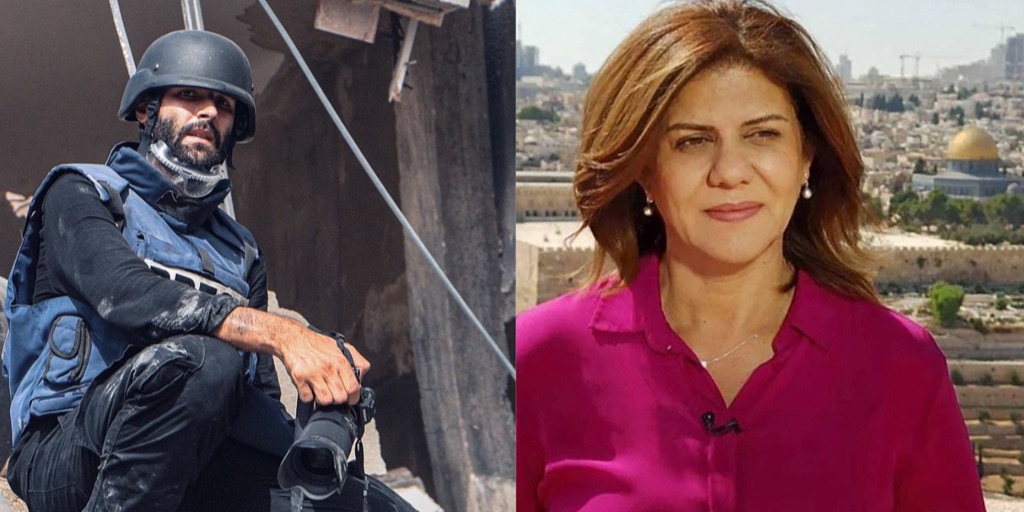Journalists in Gaza are not showing us what is happening; they are what is happening.
In the blink of an eye, reporters in Gaza put their press vests on and held cameras in their hands, shattering my previous perception — as a journalist myself — that real journalism was gone.
Motaz Azaiza, Plestia Alaqad, Bisan Owda, Hind Khoudary, Wael al-Dahdouh — these are some of the names of the unsung Palestinian heroes documenting the war on Gaza for the world to see. I had never heard of them before 7 October; today — almost two months later — I wake up every morning to check if they are still alive or not.
“I am still alive,” they say, My jaws unclench, and my shoulders relax, until it is time to start it all over the next day.
Many others, like the late Shireen Abu Akleh, Issam Abdallah, Farah Omar, Rabih al-Maamari, have lost their lives while practicing their professions, vowing to show the world the realities that are taking place in Gaza.
In Gaza and many war-torn parts of the world, the line between a civilian and a journalist is blurred — and the press vests no longer guarantee safety.
International organization ‘Reporters Without Borders’ ranked Palestine as one of the most dangerous places to be a journalist, placing it as number 156th out of 180 countries.
“Israel is suffocating journalism in Gaza,” the organization stated.
Reporters in the enclave encounter dangers while attempting to report on the conflict amid the unabating Israeli ground offensive and intense bombing campaign. These hazards involve Israeli airstrikes, interrupted communication channels, shortages in supplies, and prolonged power disruptions.
As of 8 December, the Committee to Protect Journalists (CPJ) indicated that at least 63 journalists and media personnel have been killed since 7 October. The deadliest day of the war for journalist deaths was its first day, 7 October, with six journalists killed. The second-deadliest day occurred on 18 November, with five killed.
The Palestinian Journalists Syndicate also reported on 2 December that 67 journalists and media workers have been killed in the Strip since 7 October. Meanwhile, the International Federation of Journalists, which represents journalists worldwide, said that 68 journalists had been killed covering the war on Gaza, 72 percent of all media deaths worldwide.
Head of the Freedoms Committee at the Palestinian Journalists Syndicate, Mohammed al-Laham, explained that the intensive Israeli attacks continue to hinder data documentation and monitoring.
Yet, these journalists persevere.
One silver lining that emanates from the past 55 days is the changing tide of knowledge, awareness, and solidarity with Palestine — even though some media outlets have failed to provide consistent standards to their media coverage, often perpetuating false narratives or unconfirmed reports.
The international community tunes into Palestinian journalists’ coverage and worries about their safety; because of them, people around the world are changing life-long ingrained perceptions and beliefs about the 75-year-long war on Palestine.
As a journalist myself, the past 55 days ingrained in me a profound conviction: on the one hand, I have grown more appreciative of our craft, journalism, and on the other, I have felt an enormous amount of guilt for reporting from the comfort of my own safe home, secured, while others don’t know whether they will return home alive — or even if there will be a home to return to.
In the shadows of burnout and fluffy articles, I had lost the true meaning of what it means to be a journalist — it had withered away, and I didn’t think I would ever be inspired again. Yet, I now find myself in awe of this profession and all it has to bear: the boldness, courage, passion, and dedication it requires. This inspiration has instilled in me a fervor to tell the truth, to shed light on important issues, and to value my voice as a journalist and use it to raise awareness of injustice anywhere in the world.
To the journalists in Gaza: you are my modern-day heroes. Your unwavering strength in the midst of the increasingly dire conditions is beyond inspiring — and will be remembered forever. Your fearlessness is unmatched. What you capture inspires the rest of us to muster courage in the face of opposition.
The opinions and ideas expressed in this article are the author’s and do not necessarily reflect the views of Egyptian Streets’ editorial team. To submit an opinion article, please email [email protected].







Comments (4)
[…] these difficulties, journalists from Palestine display resilience, courage, and a commitment to providing crucial insights into the human impact of the occupation. Their work remains vital in […]
Rafik, Thank you for helping people understand what Journalists do. The fact that there are MANY journalists from many publications is the main factor that gives us the ability to find the Truth behind things happening in Gaza and the world. We do NOT need to find one journal or newspaper that we are sure tells truth. We just need to look at 20 around the world that are independent and decide ourselves what is truth. I look at 10 or more every day. Here: https://www.terryking.us/news/ Skip around the world and see what is shown in many countries. Check long-regarded outlets like BBC, Guardian, New York Times, https://www.arabnews.com/, or https://www.aljazeera.com/ . I walk the Egyptian Streets along road 9 almost every day. Long ago I worked as a journalist in USA covering “elections, fires, riots and Woodstock”. Thank you for telling people about real journalists!